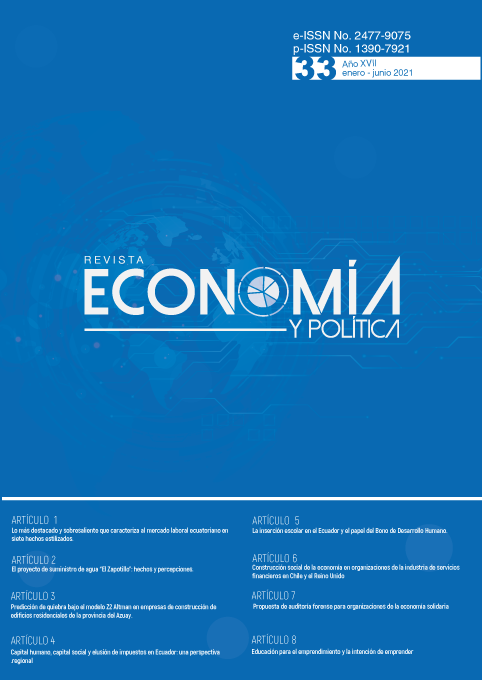Capital humano, capital social y elusión de impuestos en Ecuador: una perspectiva regional
DOI:
https://doi.org/10.25097/rep.n33.2021.04Palabras clave:
elusión fiscal, capital humano, capital socialResumen
En este trabajo se explora la relación entre el capital humano, el capital social (fuerza de las normas sociales y redes a nivel comunitario) y las prácticas de elusión de impuestos corporativos. Utilizando datos para Ecuador, se encuentra que la proporción de contadores y la diversidad ocupacional a nivel de cantón están asociadas negativamente con la elusión fiscal, aproximada por la tasa efectiva del impuesto a la renta. Esta relación es más pronunciada para las empresas que no pertenecen a ningún grupo económico. El capital social parece cumplir una función mediadora entre el capital humano y las prácticas de elusión fiscal. Los resultados contribuyen a la literatura existente sobre el papel del capital social en el desarrollo regional y destacan el papel de los incentivos sociales no económicos en las prácticas comerciales.
Descargas
Citas
Allingham, M. & Sandmo, A. (1972). Income Tax Evasion: A Theoretical Analysis. Journal of Public Economics, 1, 323-338.
Alm, J. (2016). Enforcement, Socioeconomic Diversity, and Tax Filling Compliance in the United States. Southern Economic Journal, 82(3), 725-747.
Alm, J. (2019). What Motivates Tax Compliance? Journal of Economics Surveys, 33(2), 353-388.
Alm, J., Sanchez, I. & De Juan, A. (1995). Economic and Noneconomic Factors in Tax Compliance. Kyklos, 48(1), 1-18.
Boone, J., Khurana, I. & Raman, K.K. (2013). Religiosity and Tax Avoidance. Journal of American Taxation Association, 35(1), 53-84.
Buehn, A. & Schneider, F. (2016). Size and Development of Tax Evasion in 38 OECD Countries: What do we (not) know?. Journal of Economics and Political Economy, 3(1), 1-11.
Cabrera, E., Molina Vera, A., Sharman, M. A., Moreno, L., y Cuevas, F. (2016). Análisis Geográfico de la Pobreza y Desigualdad por Consumo en el Ecuador: más allá del nivel provincial, en Reporte de Pobreza por Consumo Ecuador 2006-2014 (1era Ed.), pp. 146-172. INEC
Chen, S., Chen, X., Cheng, Q. & Shevlin, T. (2010). Are Family Firms More Tax Aggressive Than Non-Family Firms?. Journal of Financial Economics, 95(1), 41-61.
Coleman, J. (1988). Social Capital in the Creation of Human Capital. American Journal of Sociology 94, Supplement, S95–S120.
Cummings, R., Martinez-Vazquez, J., McKee, M. and Torgler, B. (2009). Tax Morale Affects Tax Compliance: Evidence from Surveys and An Artefactual Field Experiment. Journal of Economic Behavior and Organization, 70, 447–457.
Denny, K. (2003). The Effects of Human Capital on Social Capital: A Cross-Country Analysis. Working Paper, Institute for Fiscal Studies.
Dyreng, S., Hanlon, M. and Maydew, E. (2010). The Effects of Executives on Corporate Tax Avoidance. The Accounting Review, 85, 1163–1189.
Erard, B. & Feinstein, J.S. (1994). The Role of Moral Sentiments and Audit Perceptions in Tax Compliance. Public Finance, 49, 70-89.
Feld, L and Frey,B. (2002). Trust Breeds Trust: How Taxpayers Are Treated. Economics of Governance, 3(2), 87-99.
Forte, A., Peiró-Palomino, J. & Tortosa-Ausina, E. (2015), Does social capital matter for European regional growth? European Economic Review, 77 (C), 47-64.
Gennaioli, N., La Porta, R., Lopez-de-Silanes, F. and Shleifer, A. (2013). Human Capital and Regional Development, The Quarterly Journal of Economics, 128 (1), 105-164
Gordon, R. and Li, W. (2009). Tax Structures in Developing Countries: Many Puzzles and a Possible Explanation. Journal of Public Economics, 93, 855-866.
Guiso, L., Sapienza, P. & Zingales, L. (2010). "Civic Capital as the Missing Link." en Benhabi, J., Bisin, A., & Jackson, M. Eds.: Handbook of Social Economics, Elsevier Science.
Guiso, L., Sapienza, P. & Zingales, L. (2016). Long-Term Persistence. Journal of the European Economic Association, 14(6), 1401-1436.
Han, J., Han, J. & Brass, D. (2014). Human Capital Diversity in the Creation of Social Capital for Team Creativity. Journal of Organizational Behavior, 35()1, 54–71.
Hantlon, M. & Heitzman, S. (2010). A Review of Tax Research. Journal of Accounting and Economics, 50(2-3), 127-178.
Hasan, I., Hoi, C., Wu, Q.& Zhang, H. (2017). Does Social Capital Matter in Corporate Decisions? Evidence from Corporate Tax Avoidance. Journal of Accounting Research, 55(3), 629-668.
Helliwel, J. & Putnam, R. (1999). Education and Social Capital. NBER Woking Paper
Huang, J., van den Brink, H.M. and Groot, W. (2009). A Meta-Analysis of the Effect of Education on Social Capital. Economics of Education Review, 28, 454-464.
Lucas, R. (1988). On the Mechanics of Economic Development. Journal of Monetary Economics, 22, 3-42.
Kanagaretnam, K., Lee, J., Lim, C.J. & Lobo, G. (2018). Societal Trust and Corporate Tax Avoidance. Review of Accounting Studies, 23(4), 1588-1628.
Moretti, E. (2004). Workers’ Education, Spillovers, and Productivity: Evidence from Plant-Level Production Functions. American Economic Review, 94(3), 656–690.
Posner, E. (2000). Law and Social Norms: The Case of Tax Compliance. Virginia La Review, 86, 1781-1819.
Putnam, R. (1993). Making Democracy Work: Civic Traditions in Modern Italy. Princeton, New Jersey:Princeton University Press
Putman, R. (1995). Bowling Alone: America´s Declining Social Capital. Journal of Democracy, 6(1), 65-78.
Rupasingha, A., Goetz, S. & Freshwater, D. (2006). The production of social capital in US counties. The Journal of Socio-Economics, 35(1), 83-101.
Rocha, R., Ferraz, C. and Soares, R. (2017). Human Capital Persistence and Development. American Economic Journal: Applied Economics, 9(4), 105-136.
Russo, A. and Perrini, F. (2010). Investigating Stakeholder Theory and Social Capital: CSR in Large Firms and SMEs. Journal of Business Ethics, 91: 207-221.
Slemrod, J. (2004). The Economics of Corporate Tax Selfishness. National Tax Journal, 57(4), 877-899.
Slemrod, J. (2007). Cheating Ourselves: The Economics of Tax Evasion. Journal of Economic Perspectives, 21(1), 25-48.
Sondheimer, R. and Green, D. (2010). Using Experiments to Estimate the Effects of Education on Voter Turnout. American Journal of Political Science, 54(1), 174-189.
Torgler, B. (2005). Tax Morale in Latin America. Public Choice, 122(1/2), 133-157.
Wilson, J. (2000). Volunteering. Annual Review of Sociology, 26, 215-240.
Publicado
Cómo citar
Número
Sección
Licencia
Derechos de autor 2021 Revista Economía y Política

Esta obra está bajo una licencia internacional Creative Commons Atribución-NoComercial-CompartirIgual 4.0.






